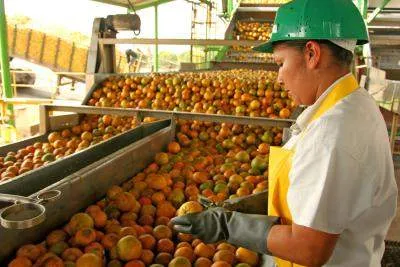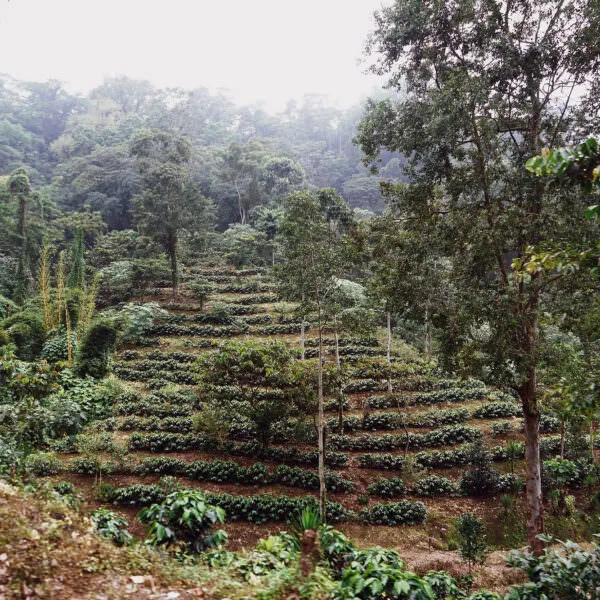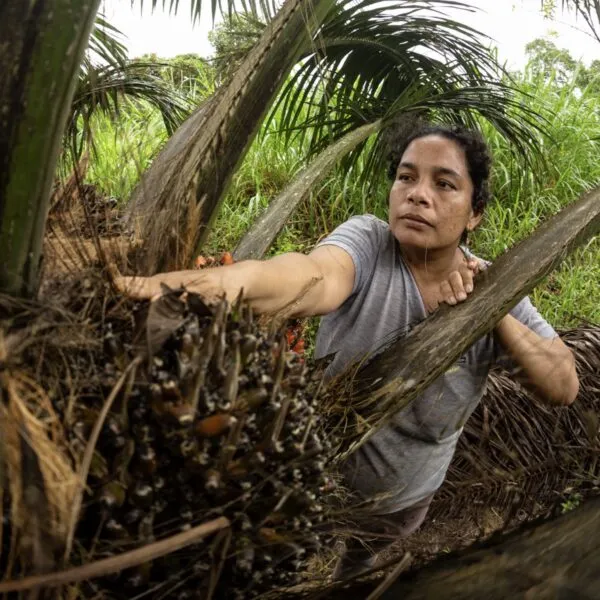Orange juice is a standard part of breakfasts all over the world, and it is also a big global business, one that employs hundreds of thousands of workers each year. Brazil produces about half of the world’s orange juice, with one third of the world’s oranges grown mainly on large monoculture plantations in the central part of the country. On these plantations, human rights issues like discrimination, low wages, and poor working conditions and environmental challenges like soil degradation and high pesticide use are common.
In 2018, we set out to address these issues by launching our Rainforest Alliance Certified orange juice program. After the first year alone, 2.66 million tons of oranges (5.1% of the world’s orange production) were produced on Rainforest Alliance Certified farms. The Rainforest Alliance orange juice program provides training to large plantations, small orange farms, and orange juice processors—in Brazil and other countries—to advance sustainable farming methods and create better livelihoods for farmers and farm workers.
Together, we’re building a future where people and nature thrive. Sign up today and join our movement.
"*" indicates required fields
Improving worker’s livelihoods through Rainforest Alliance Certified orange juice
With only a few large companies controlling the majority of the global orange juice market, market prices are competitive and hardly cover the actual costs of production. This means many small-scale farms cannot compete with large plantations and many farm workers earn well below a living wage. A living wage is the amount of money workers need to ensure a decent standard of living for themselves and their whole family—enough to meet basic expenses, like food and housing, with a little left over to cover the unexpected.
The Rainforest Alliance 2020 Certification Program requires orange farms to make clear progress towards a living wage through a model of continuous improvement. The program introduces key innovations that help farmers easily track what they pay their workers and compare this total to the appropriate living wage benchmark in their country. If a wage gap is discovered, farmers must then develop and implement a wage improvement plan in consultation with workers’ representatives.
Protecting worker’s rights on orange farms

Across orange plantations—especially in the state of São Paulo where much of production is concentrated in Brazil—workers often face long working hours, discrimination, and dangerous working conditions caused by agrochemicals and insufficient or outdated equipment. At the same time, a lack of workers’ organizations means that the voice of farm workers often goes unheard. Migrant labor and temporary contracts are also common, with many people coming from poorer areas in the north of Brazil to work on orange plantations.
Through our 2020 Certification Program, we are helping improve the situation of these farm workers through an assess-and-address approach. This approach incentivizes farms to tackle issues such as forced labor and discrimination rather than hide them. It also requires all certified farms and processing facilities to set up an internal oversight committee to this end. If abuses are identified, committee members—who will have access to remediation skills training—must then implement our Remediation Protocol and follow up with close monitoring. Rainforest Alliance certification also requires farms to stop using highly hazardous pesticides and helps them adopt alternative methods for controlling pests and diseases that are better for workers and the environment.
Helping orange farmers adapt to the effects of climate change
Orange farmers are feeling the effects of climate change as rising temperatures and unpredictable weather patterns are leading to unreliable yields and increasing the threat of pests and diseases. Citrus greening disease—a bacterial disease that attacks citrus trees—is particularly an issue in orange production that is getting worse as the climate becomes more humid in orange growing regions. At the Rainforest Alliance, we help orange farmers adapt to these impacts through climate-smart agriculture techniques. Farmers learn how to promote populations of the Tamarixia radiata wasp, ladybugs, and other natural predators of psyllids, the insects responsible for spreading the disease. They also learn to use an early warning system developed by the agricultural organization Fundecitrus that alerts farmers to the presence of psyllids across more than 138 thousand hectares of citrus farms so they can take preventive actions.
Improving biodiversity on orange farms
Biodiversity on and around large monoculture orange plantations is threatened by soil degradation and pesticide runoff into surface and ground water. In many cases, profitable production areas also overlap with high biodiversity regions that merit protection.
The Rainforest Alliance helps orange farmers conserve and improve biodiversity while increasing crop quality and yields through various requirements in our 2020 Sustainable Agriculture Standard:
- Farmers must take steps to increase the diversity of native vegetation on their farms through practices like agroforestry (a practice of nurturing existing trees and planting new ones side by side with crops) and establishing wildlife corridors.
- Farmers must also work to implement an Integrated Pest Management strategy, which helps them reduce their pesticide use through different practices such as growing crops that promote natural predators of pests.
- If a Rainforest Alliance Certified farm is identified to be in or near a Key Biodiversity Area, then specific actions are required to protect that area and the important animal and plant life within it.
What can companies, governments, and consumers do?
Rainforest Alliance certification gives orange farmers many tools to produce in a way that is better for people and nature. However, at the end of the day, we recognize that sustainable practices often require significant investments which means that the burden should not fall on farmers alone. That is why we also work with companies and governments to build sustainable supply chains from top to bottom. In the orange juice sector, we are currently collaborating with key stakeholders on several platforms, including our steering committee roles in the IDH Sustainable Juice Covenant and the Juice CSR Platform.
Consumers have a vital role to play, too. Everyday actions like choosing certified products and taking steps to reduce your environmental impact builds momentum for sustainable agriculture and a world where people and nature thrive together. Even something as simple as your morning orange juice can make a difference.
Ready to take things further? Join our global movement to fight climate change and make a positive impact on our planet by signing up for our 30-day sustainability challenge.



